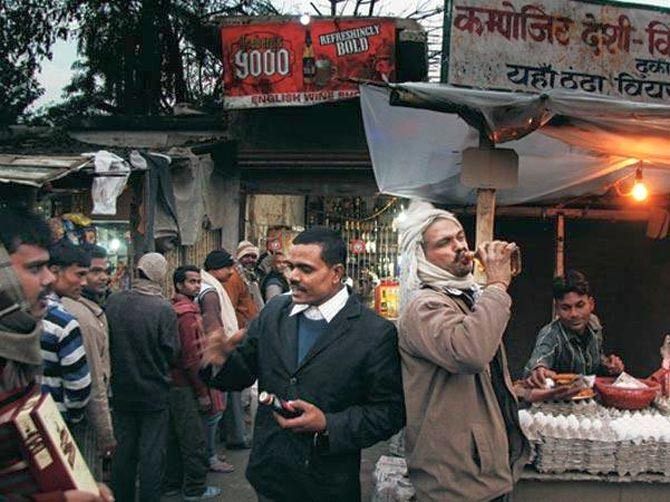Prohibition is resulting in Bihar's prisons getting overcrowded, reports Satyavrat Mishra.

Prohibition in Bihar has brought happiness to families but has also created a thriving space for illegal liquor trade and drugs.
Munni Devi is a happy woman today. For the last three months, her husband Inder Kumar has been giving her more attention and her sons have been spending time with the family.
"It wasn't like this. My husband used to hit the bottle as soon as night fell," she recalls. "Soon, my sons also picked up the nasty habit. It was a very hard time."
Inder Kumar hasn't had a drink in three months now. He takes better care of his fields and spends his evenings chatting with friends.
"Last week, he gave me money to buy this," smiles Munni Devi, awkwardly showing off her new green glass bangles.
Her youngest son, too, bought her a saree. "It must have cost him more than Rs 500. I will wear it only on special occasions," she beams with pride.
Munni Devi, who belongs to the extremely backward community, lives in Rajauli village in Bihar's Vaishali district. She is among the thousands of women whose life has turned around since prohibition was imposed in the state five months ago.
"All the women in our village support prohibition. Liquor destroys homes," she says. The initial few months, when the men did not get their daily dose of alcohol, were difficult, "but it was nothing compared to the hell we used to live in. The men would start drinking soon after sundown and then beat their wives."
Roshni Devi, a Mahadalit from the nearby Saidpur village, shares Munni Devi's enthusiasm, but cautions, "The police should be more vigilant and not let illicit liquor trade thrive. Some people are making money by selling liquor to those desperate for it."
In Bihar, prohibition has brought peace to many households. But it has also given rise to fresh problems. "Procuring country-made liquor might be tough now, but not whisky or rum," says Ashok Rai, a resident of Bidupur in Vaishali district.
The liquor is even home delivered, reveals the young man, "as long as you have a recommendation from an existing customer."
A bottle of alcohol, which would earlier cost Rs 400 to Rs 500, now sells at Rs 1,500 and can even go up to Rs 2,000, he says. The men say the police are aware of this business but don't act because "big names are involved."
Another fallout of the liquor ban has been that some have switched from alcohol to ganja (hashish). "In my husband's village, the sale of ganja, charas, bhang and other such intoxicants has skyrocketed," says a resident of Saidpur village.
Others like Ashok Rai's grand-uncle Ram Sunder Rai say that by imposing prohibition, Bihar Chief Minister Nitish Kumar is only correcting a past mistake of his.
"It was he who had got so many liquor shops opened in the first place," says the octogenarian. "He should have taken this step earlier, but it is better late than never."
The last five months have seen a dip in the crime rate. Additional Director General of Police (Headquarters) Sunil Kumar says murder cases have witnessed a 31.7 per cent fall during April to July 2016 as compared to the same period last year.
"There has been a sharp fall in other crimes too -- 20 per cent in rape, 27 per cent in road robbery, 73 per cent in dacoity, 18.4 per cent in rioting and 61 per cent in kidnapping for ransom," he says.
Road accident-related deaths are also down by a little over 26 per cent.
If there is good news, there are also some worrying developments too.
State government officials say prohibition is prompting hardcore criminals to turn their attention to the illegal liquor business.
A few days ago, officials of the excise department seized more than 3,000 cartons of liquor worth Rs 80 lakh (rs 8 million) from a truck.
"We have credible information that hardcore criminals are turning to the liquor trade in the state," says Bihar Excise Commissioner Aditya Kumar Das. "It gets them big money with little risk."
Moreover, Bihar's prohibition law, although described as draconian by many, has failed to act as a deterrent to many, as almost 50 per cent of the violators booked under various sections of the law have been granted bail.
Between April and August, of the 13,805 people arrested, 5,990 were given bail.
"Most of them were booked for storing liquor, a crime not punishable under the previous law," says Das. "But that will now change. The governor has approved the new excise Bill, which is very stringent."
Prohibition is also creating some problems that the state government did not foresee -- the prisons are getting overcrowded.
"We have a capacity of 37,000 and almost 29,000 criminals are already lodged in our jails," says a senior official of the jail department. "At this rate, we will need to build more prisons."
The sale of narcotics has also soared.
On September 7, the directorate of revenue intelligence seized the fourth-largest consignment of ganja, worth Rs 50 lakh (Rs 5 million), from Muzaffarpur.
"Three other such seizures have been made from the district in the last couple of months," says an official of the Narcotics Control Bureau. "According to our sources, Bihar, which was earlier a transit state, is fast turning into a user state."
The excise department also finds itself facing trouble.
On August 30, its officials raided the house of one Inderjit Sen in Nalanda district and seized several bottles of Indian-made foreign liquor. Sen is the block president of the ruling Janata Dal-United.
Following a joint inquiry by the district magistrate and the Nalanda superintendent of police, Sen was declared innocent.
Instead, the district excise sub-inspector was charged with conspiring with a local leader from the Bharatiya Janata Party to falsely implicate Sen.
The action against one of their officers has left others in the excise department wary. Some of them have asked for protection from the state government.
Clearly, Bihar's liquor-related problems are far from over.
IMAGE: Liquor stores mushroomed across Bihar before the alcohol ban was imposed. Photograph: Reuters







